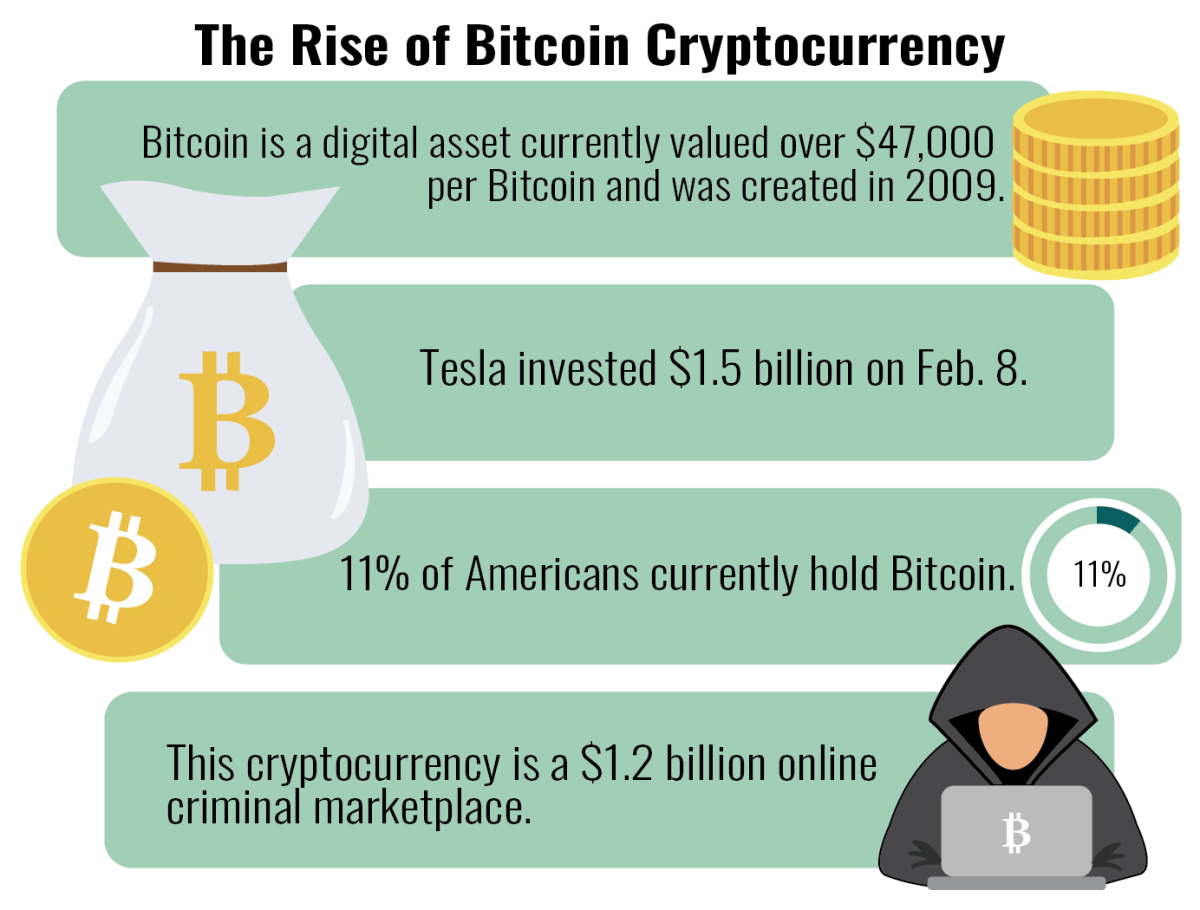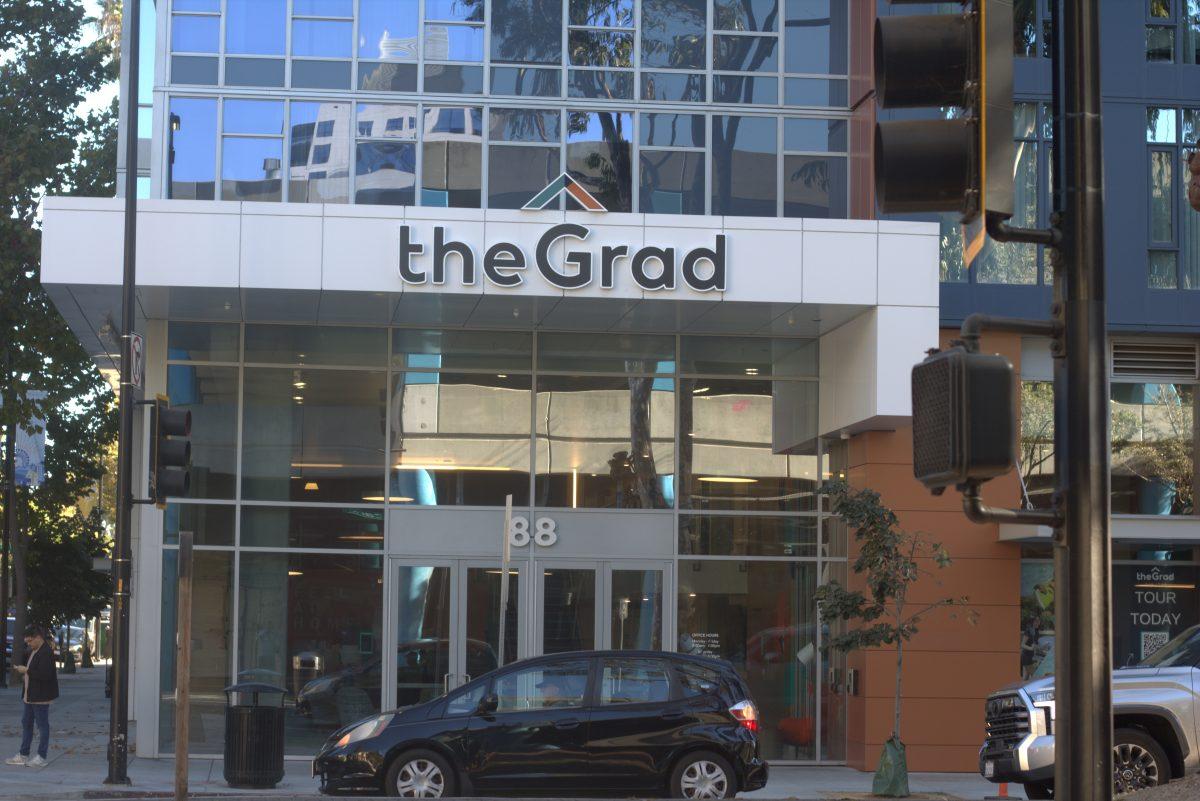There was nothing like cold-hard cash until cryptocurrency came along,and that’s the way to go if you want to be relinquished from the confines of a hovering government and a centralized banking system.
Bitcoin is a digital asset currently valued over $47,000 USD per Bitcoin and was created in 2009 by an unknown group.
According to Investopedia, “A cryptocurrency is a digital or virtual currency that is secured by cryptography, which makes it nearly impossible to counterfeit or double-spend.”
According to a Feb. 2 report from CNBC, “Tesla announced in an SEC [Securities and Exchange Commission] filing Feb. 8 that it has bought $1.5 billion worth of Bitcoin.”
Tesla’s $1.5 billion investment has reignited the cryptocurrency conversation.
Interest in cryptocurrency by the mega-rich begs the questions: Why invest in a relatively new and volatile asset you can’t see? Why go crypto at all?
Risk is the name of the game, it always has been.
Like most cryptocurrencies, Bitcoin is considered extremely unreliable.
“An estimated 11% of Americans currently hold Bitcoin,” according to Bitcoin Market Journal.
Many people are wary of this invisible game and wonder what could be wrong with fiat money, a government-issued currency that isn’t backed by a commodity such as gold.
In a society where every move can easily be tracked, cryptocurrency may offer a unique smokescreen for privacy.
In a Netflix original series from Vox News called “Explained,” narrator Christian Slater said the main attraction of Bitcoin and other cryptocurrencies is “a way to buy and sell things online without Big Brother watching.”
You don’t need Margot Robbie in a bathtub from The Big Short (2015) to explain how easily the average person can be tracked through credit card and online payments.
Cryptocurrency is inherently a symbol of freedom.
However, the blessing of cryptocurrency’s privacy has also proven to be its curse.
The smokescreen desired by those looking for freedom from peeping governments is also the same concealment craved by criminals.
Bitcoin’s dark side has been exposed as an anonymous playground for criminal purchases.
This crypto-landscape is a “$1.2 billion online criminal marketplace,” according to “Explained.”
Silk Road, an online marketplace, has been the host of illegal and drug-related transactions.
In addition to its black market reputation, Bitcoin also consumes an extreme amount of electricity to “mine” more Bitcoin.
“Bitcoin mining is the process of creating new bitcoin by solving a computational puzzle,” this is necessary to maintain the ledger of transactions upon which bitcoin is based, according to Investopedia.
As reported by an Aug. 13, 2015 Business Insider article, the largest Bitcoin mining companies are in China and most of their power comes from filthy coal plants.
Smog and other poor conditions created in the process of mining Bitcoin poses a growing threat to the planet’s environment.
The exorbitant energy use and memory required to mine and transact Bitcoin and other cryptocurrencies is a large risk for an unstable currency that encourages criminal transactions.
But even with these two major drawbacks, Bitcoin and similar cryptocurrencies do more good than bad.
Governments can legally “freeze [bank] accounts, shut down ATMs, decide who gets cut off from financial services, and even seize private funds,” according to Crisprsociety, a blog on gene and cell therapies.
This action is a commonly used tactic against activists, dissidents, and opposers of ruling parties.
Bitcoin is another possible way to fight against this type of immobilization.
It’s an opportunity to express financial freedom without the certainty of the government looming over your shoulder and monitoring each online or in-store purchase.
Some of the more common concerns over cryptocurrency are the possibilities of abuse, scamming and fraud.
Scamming and fraud happen everyday in the stock market and other financial schemes.
The possible abuse and criminality of cryptocurrency is no different than the possible abuse of other established norms in the U.S.
For example, the First Amendment guarantees freedom of speech; you may not like your Resident Adviser telling you your music is too loud or your taste in late ‘70s disco is less than braggable, but that’s the price we pay for freedom of speech.
The Second Amendment guarantees the right to bear arms, a right that’s been regularly abused to commit murders and other heinous acts.
But these abuses don’t discredit what the amendments were created to provide.
In the same way, the criminal abuses of cryptocurrencies shouldn’t detract from the admirable endeavor of free and decentralized financing.
The use of cryptocurrency is a viable option for those looking for privacy, new ways to invest, or even financial security. This would be beneficial in a society where too much of our banking systems are dependent on each other.
The best way to save yourself from a falling house of cards is to find another house.









































